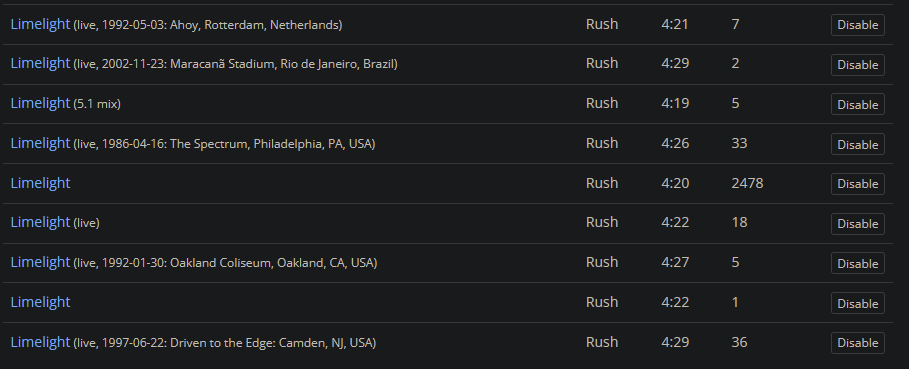https://acoustid.org/track/01b7aa6b-8e1a-47d7-93a1-3ac80d05b298
Do you ask, if it is possible, that “Rush” has released the same song “Limelight” in many different (live) versions?
It is a common mess. I’ve spent way too many hours looking at AcoustIDs and recognise it all too well.
< Start old git rant ![]() >Personally I think the “Submit AcoustID” button is a little too visible in Picard. It should only appear in an advanced \ I know what I am doing mode.
>Personally I think the “Submit AcoustID” button is a little too visible in Picard. It should only appear in an advanced \ I know what I am doing mode.
The more you wade around AcoustId, the more you get used to the fact some people just submit any old data without checking. There are people who hit the forums who talk of throwing 1000s of tracks into Picard at a time… if any of those hit “Submit AcoustIDs” on a big unchecked heap of bootlegs, then it leads to mess like this.< End old git rant ![]() >
>
When I look at a few of those live tracks I see they have multiple AcoustIDs attached. I expect if I compared the fingerprints the differences would start to show out.
The bonus here is the real track is the one with 2478 samples. And the 5.1 mix is usually the same audio. The others have come from name matches and bad data uploads.
Imagine how much of a boring live band one would have to be to create exactly the same sound every time. ![]()
There are many many quality data uploaders and the more there are, the easier a mess like this is to spot from the bad data… I am certainly not criticising any who are reading this forum as I know you all like accurate data…
There is no simple answer to polluted data. Unless you own all the bootlegs listed, and can compare clean samples of every track… all we can really do is dip out the quality stuff which is flagged up by the volume of samples.
In case I read you correctly, you can’t help this. AcoustID is simply not designed to differentiate such occasions. The beginnings (first 2 min?) of these recordings seem to appear to be too damn close to each other so the fingerprints are similar enough to grant a match. Of course, without closer checking, there’s always a chance some of those examples are just bad data submitted errousnoly.
The Rotterdam is an easy one to fix. When you look at that album there is a simple pattern of most tracks having a good clean single sample. And a few tracks with double samples.
Check out the Limelight from that gig and it has two acoustIDs:
edac36cf-8b45-4da7-93eb-24ca17a3866f×, 01b7aa6b-8e1a-47d7-93a1-3ac80d05b298×
They compare very different ( Compare fingerprints #26465768 and #12041680 | AcoustID )
Then check the “additional user submitted data” on edac36cf-8b45-4da7-93eb-24ca17a3866f and it is clear that is the Holland gig. So I would disable the link betweeen 01b7aa6b and Holland with confidence high there.
Yeah - I have looked at a LOT of these… and used to how to clean up the more obvious ones.
Edit: That Rotterdam gig is a perfect example. Four tracks have double’d acoustIDs, and it is clear which is the duffer in every case. Data is not always that clear. Rush fans look like they submit AcoustIDs from multiple apps. Which helps a lot.
But it does… If you have a big bootleg collection you can see this in action. Go find a track you have multiple copies of and you’ll find the band has never played it the same twice. And never the same as the album. Maybe a heavy synth band with everything pre-programmed could, but not live guitars and energy like Rush over a span of 20 years.
I have geek’d out ![]()
![]() with this data far too much. And it is impressive as to how much AcoustID can show with a good source.
with this data far too much. And it is impressive as to how much AcoustID can show with a good source.
